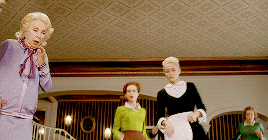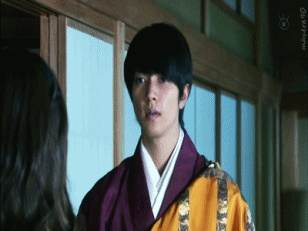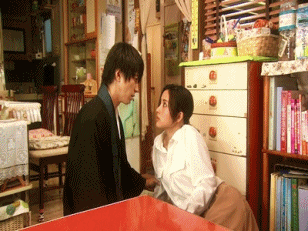|
|
楼主 |
发表于 2014-9-9 02:27
|
显示全部楼层
http://www.koreanfilm.org/kfilm14.html#haemoo
Haemoo
Yeosu Port, Western Sea, circa 1997. Cheol-ju (Kim Yun-seok, The Thieves), captain of an aging fishing vessel Advance, realizes that the harsh, post-IMF crisis economic condition will soon result in the loss of his ship and unemployment for his skeleton crew-- the bull-like boatswain Ho-young (Kim Sang-ho, Running Man), the sneering, thuggish, poodle-haired fishing-line "roller" Kyung-gu (Yoo Seung-mok, A Werewolf Boy), the perpetually horny, slightly cretinous deck-hand Chang-wook (Lee Hee-joon, Helpless), the soft-spoken and fragile chief engineer Wan-ho (Moon Sung-geun, A Girl at My Door) hiding from debt collectors and the young rookie Dong-sik (Park Yoo-chun, a.k.a. Micky Yoochun of JYJ).
Haemoo Against his better judgment, the captain decides to take on the job of smuggling a human cargo of ethnically Korean illegal laborers from China. The "shipment" turns out to include a pretty young girl Hong-mae (Han Ye-ri, The Commitment) to whom Dong-sik feels an immediate attraction. In order to escape the attentions of a corrupt coast guard officer (Yoon Je-moon, Dangerously Excited), Cheol-ju places his grumbling, unhappy "passengers" inside the storage tanks for the catch. However, a terrible, unforeseen accident takes place, forcing Cheol-ju and other crew members to reassess their plan. As the Advance sits enveloped in a curtain of sea fog, Dong-sik desperately attempts to reason with the increasingly agitated captain.
Haemoo (meaning "sea fog" in Korean) is written and directed by Shim Seong-bo, Bong Joon-ho's screenwriting partner for Memories of Murder (2003), adapted, like the latter thriller, from a stage play originally produced by the Yeonwoo Theater Troupe, also responsible for providing the source material for King and the Clown (2006). As you could readily guess by its stage-bound origins, the engine that drives this compact, taut thriller is primarily the ensemble acting by its superb cast, but this is not to say this particular adaptation is not cinematic. While the film eschews the kind of expansive, panoramic visuals we are used to seeing in a Hollywood blockbuster-- it largely avoids spectacle-oriented CGI effects, the kind that The Admiral: Roaring Currents, for one, indulges in, except for a rather symbolic depiction of a sinking ship in the apocalyptic climax-- one immediately notices the extraordinary beauty of Alex Hong's (Snowpiercer) cinematography, followed by Jeong Jae-il's (Flower Island) non-intrusive music and Lee Ha-joon (The Face Reader) and his team's intimate yet dense production design that keeps the ship's inner space dark, drippy-wet and oppressive (punctuated by jolting, sometimes tension-defusing, bursts of steam) yet believably looking lived-in.
The movie's tone harbors somewhere between the morally sensitive paranoia (with a deep appreciation of the ironic absurdity of human conditions) of an Alan J. Pakula thriller such as Klute (1971) or Parallax View (1973) and Roman Polanski's just-this-side-of-full-blown-psychosis simmering of Knife in the Water (1962), although it is not difficult to glean producer and co-screenwriter Bong Joon-ho's pet thematic concerns, with the poignantly-monikered Advance serving as a microcosm of the postwar Korean society propelled by the developmentalist ideology and Kim Yun-seok as its not-quite innately evil but fatally misguided "leader," ready to sacrifice "disloyal" and "foreign" elements to "save the ship." Many will recognize a satirical portrait of the arch-patriarchal political leadership of late 20th century Korea in his characterization (Yim Pil-sung's Antarctic Journal also pushes the character of the expedition leader played by Song Kang-ho toward this direction, with more mixed results).
Kim actually abandons his patented slow-burn villainy for this film: his Cheol-ju is instead full of poorly articulated resentment and rage, exploding in bursts of hatefully whiny-sounding accusations, paranoid pronouncements ("We are all gonna die here!") and self-justifications ("Who am I trying to protect with all this crap? You!"). Han Ye-ri, not a conventional plastic-surgery-altered beauty, is the perfect embodiment of a doe-like creature gracefully wielding marble-white long limbs, yet with a hardened, survival-minded core: it is to director Shim's credit that her desperate friendship/romance with Park Yoo-chun feels completely natural, despite the dire circumstances facing the characters. She was almost the best thing in T.O. P.-starring The Commitment and she likewise almost outshines the more aggressive theatrics of her male co-stars here.
Haemoo is not really designed to appeal to the same audience who flocked to Roaring Currents this summer, soon (as of mid-August 2014) to be crowned the biggest moneymaker in Korean film history (not coincidentally, the current champ is Bong's The Host): there are no great seafaring spectacles, and the scale of the story remains resolutely intimate, set within a single fishing vessel for most of the movie. Yet it is a terrific thriller and psychological drama, with the kind of richness of character and the appreciation of complexity of human motives that one looks in vain in screen-dominating blockbusters of today. Haemoo is yet one more evidence for my theory that the genre that Korean cinema truly excels at this juncture, globally speaking, is the mid-level-production psychological thriller in the '70s American cinema mold, rather than horror, comedy or even tear-jerking melodrama. (Kyu Hyun Kim) |
|









































